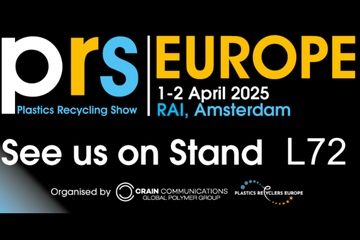UPDATE - EDITORIAL
A fresh start in Amsterdam: what the European recycling industry hopes to gain from PRSE – Vincent Breit
Info: At PRSE 2025 this year, the KI.PIE Group and the Plasteurope.com Price Team will be present for the first time with their own stand – L72 in Hall 5. Stop by and talk with us!
31.03.2025 15:04:06
 PIE and the KI.PIE Group at PRSE 2025: come see us at Stand L72 in Hall 5 (Image: PIE) |
When the European recycling industry gathers at the Plastics Recycling Show Europe (PRSE) in Amsterdam starting 1 April, the mood is likely to be rather gloomy. The current economic situation appears too uncertain for businesses.
Anyone wanting to witness the dramatic developments in the market firsthand need only step outside the exhibition halls. The Netherlands is currently experiencing an unprecedented wave of bankruptcies, pulling more and more recycling companies into financial ruin. Across the rest of Europe, voices predicting a difficult future for the industry – at least in the short to medium term – are growing louder.
The fact that recycling companies are looking ahead with apprehension is also due to the image of the products in question – many industries still consider recyclates inferior, and the willingness to pay big money for these so-called “secondhand” materials is consequently lower.
However, the processing of post-consumer recycled (PCR) materials in particular requires enormous effort and cost. This makes it difficult to turn a profit, and there is a lack of clear directives without loopholes.
The EU’s proposed mandatory recyclate usage quotas have so far failed to stabilise or even increase demand. On the contrary, the constant back-and-forth in Brussels regarding the percentage requirements only adds to the uncertainty for all market participants. Yet the example of PET shows that it can work.
Additionally, some regulations are unrealistically strict for certain applications. For instance, mechanically recycled materials rarely meet the stringent requirements for use in food-contact materials. And since quality degrades with each recycling cycle, the question of long-term sustainability is becoming increasingly urgent.
Meanwhile, financially powerful corporations are pushing what they see as a universal solution – chemical recycling. However, this approach is highly controversial. Not only are the costs very high, but diverting sorted fractions that could be used in mechanical recycling towards chemical recycling also contradicts the original idea of a complementary, non-competitive circular economy.
Anyone wanting to witness the dramatic developments in the market firsthand need only step outside the exhibition halls. The Netherlands is currently experiencing an unprecedented wave of bankruptcies, pulling more and more recycling companies into financial ruin. Across the rest of Europe, voices predicting a difficult future for the industry – at least in the short to medium term – are growing louder.
The fact that recycling companies are looking ahead with apprehension is also due to the image of the products in question – many industries still consider recyclates inferior, and the willingness to pay big money for these so-called “secondhand” materials is consequently lower.
However, the processing of post-consumer recycled (PCR) materials in particular requires enormous effort and cost. This makes it difficult to turn a profit, and there is a lack of clear directives without loopholes.
The EU’s proposed mandatory recyclate usage quotas have so far failed to stabilise or even increase demand. On the contrary, the constant back-and-forth in Brussels regarding the percentage requirements only adds to the uncertainty for all market participants. Yet the example of PET shows that it can work.
Additionally, some regulations are unrealistically strict for certain applications. For instance, mechanically recycled materials rarely meet the stringent requirements for use in food-contact materials. And since quality degrades with each recycling cycle, the question of long-term sustainability is becoming increasingly urgent.
Meanwhile, financially powerful corporations are pushing what they see as a universal solution – chemical recycling. However, this approach is highly controversial. Not only are the costs very high, but diverting sorted fractions that could be used in mechanical recycling towards chemical recycling also contradicts the original idea of a complementary, non-competitive circular economy.
 Vincent Breit, Senior Analyst on the Plasteurope.com Price Team (Photo: PIE) |
Furthermore, there is growing concern that major players from the production and consumer industries could form an exclusive club and carve up the market among themselves. If that happens, the majority of small and medium-sized recycling companies would be left out in the cold when mandatory quotas eventually take effect.
Let’s hope, then, that the PRSE trade fair in Amsterdam fosters a spirit of optimism and helps spread the recycling industry’s key message to a broader audience: production waste in Europe is a valuable resource and incineration would be a shame. Every stakeholder along the value chain – from collection and sorting to recycling, customer industries, and end consumers – should recognise that recycled plastics waste deserves top notch pricing. Objectively, it has for a long time.
Vincent Breit
Senior Analyst Plasteurope.com Price Team
Let’s hope, then, that the PRSE trade fair in Amsterdam fosters a spirit of optimism and helps spread the recycling industry’s key message to a broader audience: production waste in Europe is a valuable resource and incineration would be a shame. Every stakeholder along the value chain – from collection and sorting to recycling, customer industries, and end consumers – should recognise that recycled plastics waste deserves top notch pricing. Objectively, it has for a long time.
Vincent Breit
Senior Analyst Plasteurope.com Price Team
31.03.2025 Plasteurope.com [257683-1]
Published on 31.03.2025

 German version of this article...
German version of this article...